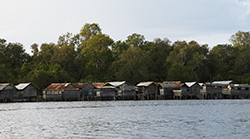Sustainable mangrove management an essential response to climate change
15 November 2017

This coastal community in the Betung Kerihun National Park, Indonesia, is vulnerable to the impacts of climate change, and sustainable mangrove management is an essential for the continued well-being of residents. Photo: K. Sato/ITTO
The sustainable management of mangroves is crucial for global efforts to mitigate and adapt to climate change and requires much more attention from policymakers, according to ITTO’s Executive Director, Gerhard Dieterle, who made the remarks at a side-event during the 23rd Conference of the Parties to the United Nations Framework Convention on Climate Change (UNFCCC COP23), now underway in Bonn, Germany. Mangroves store large amounts of carbon, protect and increase the resilience of coastlines, and are sources of income for millions of coastal-dwelling people.
Dr Dieterle called for sound land-use planning in coastal regions, integrated mangrove management for multiple benefits, and innovative financial mechanisms to enable communities to improve their livelihoods, protect coastlines and arrest mangrove loss and degradation, thereby helping achieve Sustainable Development Goal (SDG) 13, “Combating climate change”, SDG 14, “Life below water”, and other SDGs.
The side-event “Mangroves in the tropics: realizing their potential for climate-change mitigation and adaptation”, which was held on 13 November 2017, was organized jointly by the REDD+ Research and Development Center at the Forestry and Forest Products Research Institute of Japan, the Japan International Cooperation Agency, Indonesia’s Ministry of Environment and Forestry, the Center for International Forestry Research, and ITTO. UNFCCC COP23, which finishes on 17 November, is working on issues related to operationalizing the Paris Agreement on climate change.
Speakers at the side-event emphasized the need to scale up national and global efforts to strengthen the vital contributions of mangrove ecosystems to the 2030 Agenda for Sustainable Development and the Paris Agreement. They called for the mainstreaming of mangroves into national and international strategies on climate-change mitigation and adaptation under the nationally determined contributions (NDCs) of the Paris Agreement and to achieve the SDGs.
The side-event highlighted the case of Indonesia, which hosts the world’s largest area of mangroves and which is making its NDCs according to four pillars: emission reductions; economic growth; climate resilience; and equal opportunity for development.
Participants in the side-event recognized the contributions of mangrove ecosystems to SDG 5, “Gender equality”. In many regions, women are taking the lead on mangrove restoration and rehabilitation, the adoption of agroforestry practices for food production, the promotion of clean energy (such as through the adoption of fuel-efficient stoves and sustainable mangrove management), and a range of income-generating activities, including ecotourism. It was noted, however, that the further empowerment of women is needed through capacity building, access to financing, and legal frameworks that secure user rights.
The side-event discussed how to best measure “blue carbon”. Participants heard about the project “Comprehensive assessment and conservation of blue carbon ecosystems and their services in the coral triangle”, which is being implemented in Indonesia, Japan and the Philippines in collaboration with the Japanese private sector. Speakers stressed the need for data on carbon dynamics and environmental services, and mapping, in local efforts to conserve and manage coastal ecosystems.
Other topics addressed at the side-event included mangrove management in light of rising sea levels; involving youth in mangrove protection and policymaking; threats to mangroves in Indonesia; the development of criteria and indicators on mangroves; and the long-term sustainability of mangrove management. In addition to Dr Dieterle, the side-event featured the following speakers:
- Mr Koji Makimoto, Deputy Director General of the Forestry Agency of Japan
- Prof Daniel Murdiyarso, Principal Scientist, Center for International Forestry Research
- Dr Ruandha Agung Sugardiman, Director of Forest Resources Inventory and Monitoring on behalf of Dr Nur Masripatin, Director General of Climate Change, Ministry of Environment and Forestry, Indonesia
- Dr Yasumasa Hirata, Principal Research Director, REDD R&D Center, Forest and Forest Products Research Institute, Japan
- Ms Cecile Bibiane Ndjebet, President of the African Women’s Network for Community Management of Forests, Cameroon
- Mr Takahiro Morita, Group Director, Global Environment Department, Japan International Cooperation Agency, Japan
Please see below for side event presentations.